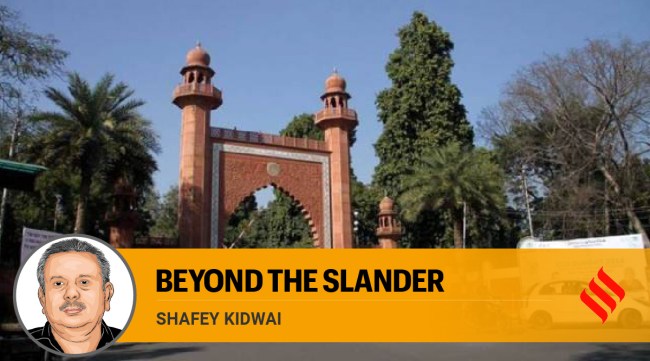Opinion AMU, beyond the anti-India slander
When the movement for a separate homeland was looked up with reverent awe, the Aligarh Muslim University stood against the myopic attempt and still stands for free inquiry, large-hearted tolerance and scientific temper
 When the movement for a separate homeland was looked up with reverent awe, the Aligarh Muslim University stood against the myopic attempt and still stands for free inquiry, large-hearted tolerance and scientific temper.
When the movement for a separate homeland was looked up with reverent awe, the Aligarh Muslim University stood against the myopic attempt and still stands for free inquiry, large-hearted tolerance and scientific temper. Does a continual sneering campaign against Aligarh Muslim University on one pretext or the other betray the unbridled power of politicians to shape reality? Do they have the power to reshape reality by roping in half-truths, distortion and selective dissemination of facts? The answer to the above questions is “yes”. The university, notwithstanding its proven academic credentials, is being described as an abode of unpatriotic traitors where hate-filled, obnoxious texts by some Pakistani authors find a place. For politicians who do not even have the foggiest idea of academic discourse, the university seems to be “shamelessly unrelenting” about their demands to remove works by such authors from its curricula as well as the portrait of Jinnah, who visited the AMU students union building in 1938. Amidst this cacophony, it is time to pause. One has to go beyond the willing suspension of disbelief created by politicians and some sections of the media.
They vehemently allege that Aligarh Muslim University (AMU), the so-called hub for fundamentalist and obscurantist ideologies use anti-India texts produced by some Pakistani authors. The syllabus of various departments and the list of books available on the university’s website clarify what is being taught. It bears testimony that no department refers to such outrageous texts. However, some prominent Pakistani Urdu poets such as Nasir Kazmi, Faiz, and Muneer Niyazi, who poignantly portray various human predicaments and have no anti-India agenda, are being taught. Similarly, in Islamic studies, the syllabus of various schools representing different interpretations of Islam are taught. Here, one can find some recommended readings of different ideologues belonging to various countries, but their texts locate Islam through various prisms without having any reference to India.
As far as Jinnah’s relation much-touted with the university is concerned, not many know that the university in 1939 refused a substantial amount of money bequeathed in Jinnah’s will. The will, signed on May 30, 1939, says: “All my residuary estate, including the corpus that may fall after the lapse of life interests or otherwise to be divided into three parts — and I bequeath one part to Aligarh Muslim University, one part to Islamia Peshawar and one part to Sindh Madrasa of Karachi”.
The will was made much before Partition, and the property was not declared “enemy property”. AMU was wary of Jinnah’s divisive policies and turned down the offer. There is no denying that Jinnah visited the AMU students’ union hall in 1938, and life membership was conferred upon him. M K Gandhi, C V Raman Rajendra Prasad, E M Forster, Jawaharlal Nehru, and Jayaprakash Narayan are some of the other recipients of this honour. Can retaining the truths of history be described as an act of betrayal?
Academic institutions should be purveyors of authentic accounts and historical evidence is still our best guide to what the past has in store. The question of complex cultural ancestry still keeps us on tenterhooks. However, in the post-truth period, self-seeking politicians find it relatively easy to trigger a new kind of shamelessness that prompts us to recognise falsehood as a lie yet accept it as if it were the truth.
AMU never approved the policy of hatred and division and its students Maulana Mohammad Ali, Maulana Shaukat Ali, Khan Abdul Ghaffar Khan, Hasrat Mohani, Raja Mahendra Partap, Zakir Husain, Rafi Ahmad Kidwai, among others, spearheaded the movement against British rule in India. They stood for a shared legacy in line with Syed Ahmad Khan’s ideology, which espoused the cause of mutual brotherhood and resisted all kinds of enslavement and exploitation.
When the movement for a separate homeland was looked up with reverent awe, the Aligarh Muslim University stood against the myopic attempt and still stands for free inquiry, large-hearted tolerance and scientific temper.
The writer, a bilingual critic, is a professor of Mass communication, Aligarh Muslim University






